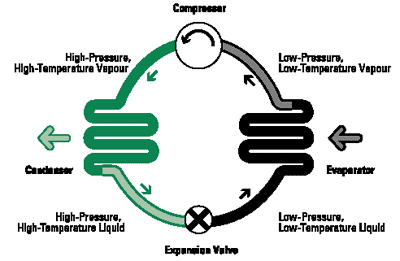In our energy efficiency series of articles featured each Thursday, we provide strategies or information on how to make your new home energy efficient and comfortable.
A heat pump is an electrical device that extracts heat from one place and transfers it to another. The heat pump is not a new technology; it has been used in Canada and around the world for decades. Refrigerators and air conditioners are both common examples of this technology.
Heat pumps transfer heat by circulating a substance called a refrigerant through a cycle of evaporation and condensation (see graphic above). A compressor pumps the refrigerant between two heat exchanger coils. In one coil, the refrigerant is evaporated at low pressure and absorbs heat from its surroundings. The refrigerant is then compressed en route to the other coil, where it condenses at high pressure. At this point, it releases the heat it absorbed earlier in the cycle.
Refrigerators and air conditioners are both examples of heat pumps operating only in the cooling mode. A refrigerator is essentially an insulated box with a heat pump system connected to it. The evaporator coil is located inside the box, usually in the freezer compartment. Heat is absorbed from this location and transferred outside, usually behind or underneath the unit where the condenser coil is located. Similarly, an air conditioner transfers heat from inside a house to the outdoors.
The heat pump cycle is fully reversible, and heat pumps can provide year-round climate control for your home – heating in winter and cooling and dehumidifying in summer. Since the ground and air outside always contain some heat, a heat pump can supply heat to a house even on cold winter days. In fact, air at –18°C contains about 85 percent of the heat it contained at 21°C.
Now that we have you saying “huh?” like I did, you probably want to learn more.
If you are exploring the heating and cooling options for a new house or looking for ways to reduce your energy bills, you may be considering a heat pump. A heat pump can provide year-round climate control for your home by supplying heat to it in the winter and cooling it in the summer. Some types can also heat water.
In general, using a heat pump alone to meet all your heating needs may not be economical. However, used in conjunction with a supplementary form of heating, such as an oil, gas or electric furnace, a heat pump can provide reliable and economic heating in winter and cooling in summer. If you already have an oil or electric heating system, installing a heat pump may be an effective way to reduce your energy costs.
Nevertheless, it is important to consider all the benefits and costs before purchasing a heat pump. While heat pumps may have lower fuel costs than conventional heating and cooling systems, they are more expensive to buy. It is important to carefully weigh your anticipated fuel savings against the initial cost. It is also important to realize that heat pumps will be most economical when used year-round. Investing in a heat pump will make more sense if you are interested in both summer cooling and winter heating.
In addition to looking at cost, you should consider other factors. How much space will the equipment require? Will your supply of energy be interrupted on occasion? If so, how often? Will you need changes or improvements to your ducting system? How much servicing will the system need, and what will it cost?
Becoming fully informed about all aspects of home heating and cooling before making your final decision is the key to making the right choice. The Natural Resources Canada Office of Energy Efficiency website offers additional information on what heat pumps are and other variables to consider. Follow this link for additional information.
Do you homework and your shopping and you should find a system that best suits your needs. Also, remember to see if you are eligible for any grants or incentives on a federal, provincial or local level.
Each Thursday, we will feature a blog entry about energy efficient new homes, covering a range of topics from building innovations to ratings systems to “score” your home’s efficiency. Subscribe to theDrummondHousePlans blog to make sure you get the latest news on how to make your new or renovated home energy efficient.

